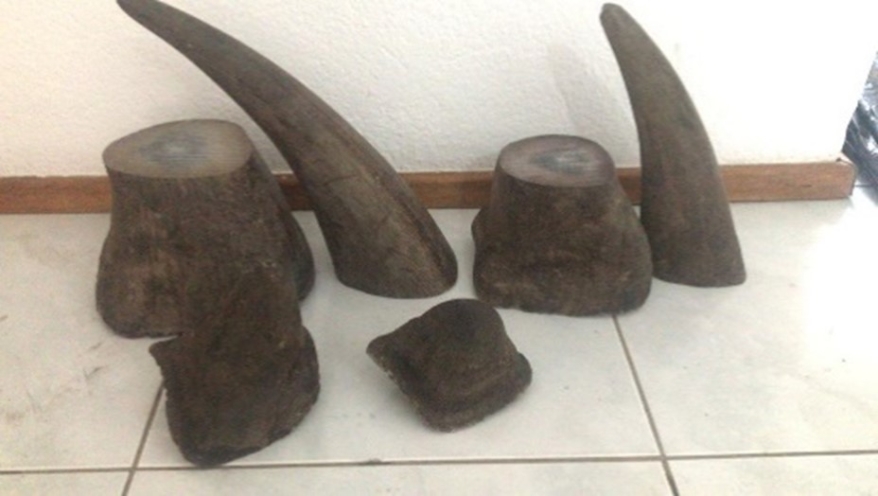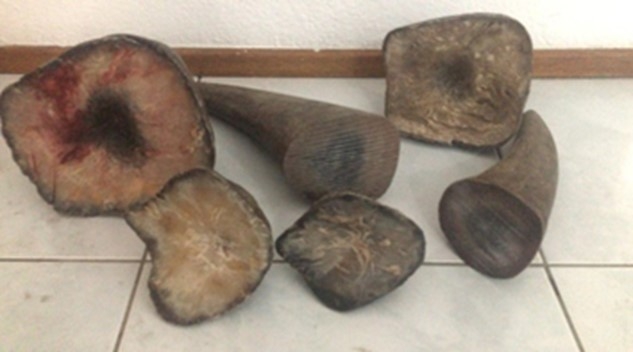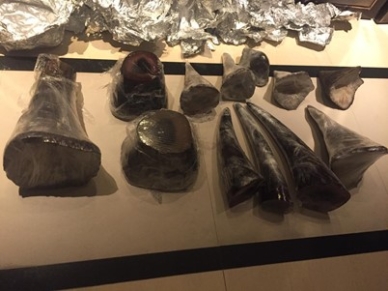Damian Williams, the United States Attorney for the Southern District of New York, and Edward J. Grace, Assistant Director for the U.S. Fish and Wildlife Service Office of Law Enforcement, announced today that TEO BOON CHING, a/k/a “Zhang,” a/k/a “Dato Sri,” a/k/a “Godfather,” was charged for participating in a conspiracy to traffic in more than 70 kilograms of rhinoceros horns valued at more than $725,000 that involved the illegal poaching of numerous rhinoceros, an endangered wildlife species. In addition, CHING was charged with laundering the proceeds of his illegal rhinoceros horn sales. CHING, a citizen of Malaysia, was arrested in Thailand on June 29, 2022, at the request of the United States pursuant to our bilateral extradition treaty. CHING was extradited to the United States earlier today and will appear before Magistrate Judge Gabriel W. Gorenstein this afternoon. The case has been assigned to U.S. District Judge Paul A. Crotty.
Earlier today, CHING and his associated entities were sanctioned by the U.S. Treasury Department Office of Foreign Assets Control (OFAC) pursuant to E.O. 13581, as amended.
U.S. Attorney Damian Williams said: “Teo Boon Ching is alleged to be the leader of a transnational criminal enterprise trafficking in rhinoceros horns, enriching poachers responsible for the senseless illegal slaughter of numerous endangered rhinoceros, and furthering the market for these illicit products. The protection of endangered wildlife and the preservation of our natural resources is an important priority for this Office. Thanks to the tireless efforts of the U.S. Fish and Wildlife Service, this defendant has been caught and brought to the United States to answer for his alleged crimes.”
U.S. Fish and Wildlife Service Office of Law Enforcement Assistant Director Edward J. Grace said: “This extradition is a major success for wildlife and people. Thanks to our federal and international partners, this wildlife trafficker now will have his day in court. Wildlife traffickers run complex international criminal enterprises that require a multinational law enforcement effort to investigate, arrest and prosecute them for their crimes. I laud the efforts of our special agents, the U.S. Department of Justice, U.S. Department of State Office of Foreign Assets Control, and especially the Royal Thai Police for their commitment in addressing this global problem that is pushing many species to extinction.”
As alleged in the Superseding Indictment unsealed today in Manhattan federal court:[1]
CHING was the leader of a transnational criminal enterprise (the “Enterprise”) based in Asia with significant operations in Malaysia and Thailand which engaged in the large-scale international trafficking and smuggling of rhinoceros horns resulting from the poaching of numerous endangered rhinoceros. Trade involving endangered or threatened species violates several U.S. laws as well as international treaties implemented by certain U.S. laws. CHING served as a specialized smuggler, transporting rhinoceros horns from rhinoceros poaching operations primarily in Africa to the eventual customers primarily in Asia. CHING also claimed to be able to ship rhinoceros horns to the United States.
From at least in or about July 2019 through at least in or about August 2019, CHING conspired to transport, distribute, sell, and smuggle at least approximately 73 kilograms of rhinoceros horns resulting from the poaching of numerous rhinoceros and having an estimated value of at least approximately $725,472.
On a number of occasions, CHING met with a confidential source to negotiate the sale of rhinoceros horns. For example, on July 17 and 18, 2019, the confidential source met with CHING in Malaysia. During those meetings, CHING stated that he served as a “middleman”—one who acquires rhinoceros horns poached by co-conspirators in Africa and ships them to customers around the world for a per-kilogram fee. During their communications, CHING sent the confidential source numerous photographs of rhinoceros horns that CHING had available for sale and shipment, including the following:
In August 2019, the confidential source, at the direction of law enforcement, purchased 12 rhinoceros horns from CHING with money that CHING believed were the proceeds of other illegal wildlife trafficking and was in bank accounts in New York. At CHING’s direction, law enforcement deposited the purported proceeds into numerous Chinese bank accounts at an underground banking facility in Thailand to disguise the origins, source, and purposes of the monetary transactions.
On August 23, 2019, CHING then arranged for his co-conspirators to deliver twelve rhinoceros horn pieces to undercover law enforcement personnel in Bangkok, Thailand. A photograph of the rhinoceros horns delivered by CHING is below:
A United States Fish and Wildlife Service forensics laboratory examined these rhinoceros horns and concluded that two horn pieces were black rhinoceros horns and the other 10 pieces were white rhinoceros horns, both endangered species.
CHING, 57, of Malaysia, is charged with one count of conspiracy to commit wildlife trafficking, which carries a maximum sentence of five years in prison, and two counts of money laundering, which carries a maximum sentence of 20 years in prison.
The maximum potential sentences are prescribed by Congress and are provided here for informational purposes only, as any sentencing of the defendant will be determined by the judge.
Mr. Williams praised the outstanding work of the United States Fish and Wildlife Service. In addition, Mr. Williams thanked the Royal Thai Government for its assistance in the extradition of CHING to the United States and commended law enforcement authorities and conservation partners in Thailand, including the Royal Thai Police and the Office of the Attorney General. Mr. Williams also thanked the Embassy of the United States in Bangkok and the U.S. Department of Justice’s Office of International Affairs for providing substantial assistance in securing the arrest and extradition of the defendant and noted that the investigation is ongoing.
The charges contained in the Superseding Indictment are merely accusations. The defendant is presumed innocent unless and until proven guilty.
[1] As the introductory phrase signifies, the entirety of the text of the Superseding Indictment and its description set forth below constitute only allegations, and every fact described should be treated as an allegation.













